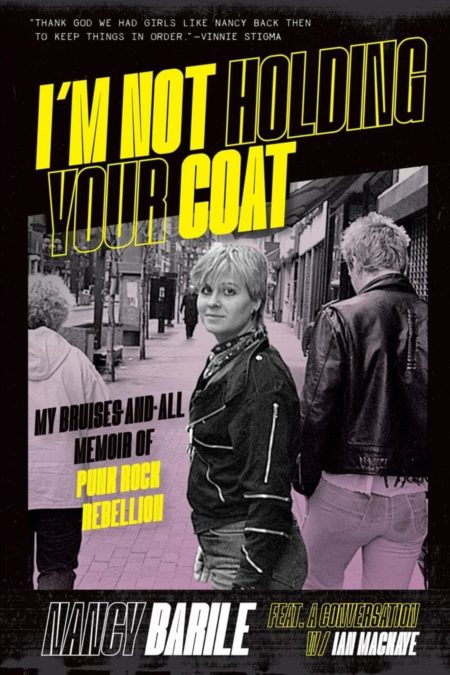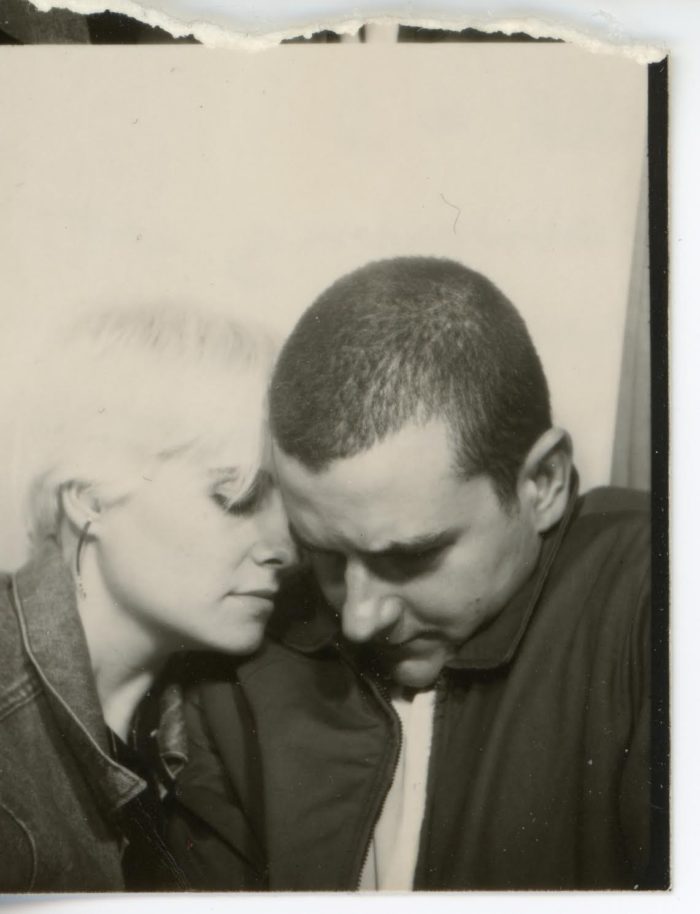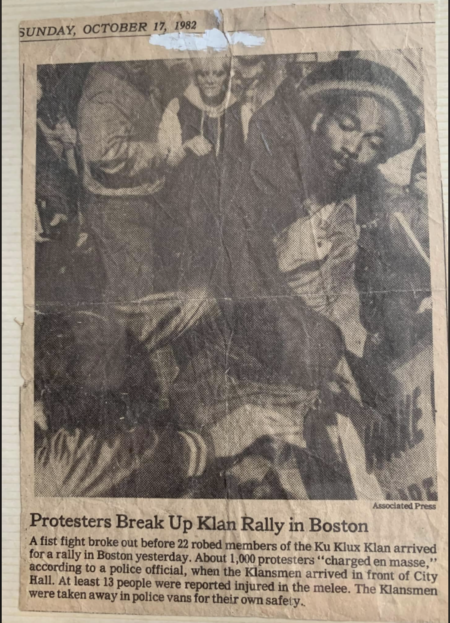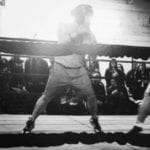“Punk also reminds me to show my students how they can use the power of words to communicate and to change the world.”

I was never a student in Nancy Barile’s classroom, but she’s taught me a hell of a lot about punk rock, dedication to life’s passions, and long-standing loyalty all the same.
The high school teacher’s debut book, I’m Not Holding Your Coat: A Bruises-and-All Memoir of Punk Rock Rebellion, hits shelves this month. To give you an idea of how much of an insider Barile is, last year, she connected me with the one and only Ian MacKaye for an interview for Boston Venue: The Channel Story podcast. She actually booked the Minor Threat and Fugazi icon for that iconic club almost 40 years ago.
Cool high school teachers are easier to come by these days than they were 40 years ago, but still, compared to anybody, battle-scarred hooligans included, Barile has an incredibly cool personal anthology of firsthand hardcore history.
So goes the great circle pit of life. As it turns out, MacKaye helped Nancy establish the framework for her memoir, helping with her intro to punk rock back in her native Philly in the ’70s. It’s all in here, along with her connection to future husband Al Barile of SSD Control, adventures in the Boston scene, several riots and uproarious gigs, a brawl with the KKK, and all sorts of other awesome stories.
I asked Nancy a whole bunch of questions, but I sure as hell didn’t ask her to hold my coat.
How long has this book been in the works?
It actually took about six years. The first book I wrote was basically “How Punk Rock Made Me a Better Teacher,” and it focused on how I use the skills and strategies I learned during my time in punk in my teaching, and it featured the stories of particular students. I got a very high-powered New York agent right away, and he put the book out to bid. I was so excited! But it turned out that people either liked the punk rock part of the book or the teacher part of the book—they didn’t like both together. So I separated the two and began working on the punk story.
How long have you been a teacher? What subject do you teach? How did punk rock influence your desire to educate?
I’ve been an English language arts high school teacher for 27 years. I’ve also been teaching in the undergraduate and graduate School of Education at a Boston area college for 11 years. I always wanted to be a teacher. I played school from the minute I went to school. But my dad said there was no money in teaching, and kids were wild, and I’d get hurt. He wanted me to be a lawyer. So I went to school to be a paralegal and worked in law firms for 11 years until I finished a couple of degrees and was able to teach. I’m not sure that punk influenced my desire to educate—that was always there. But punk did affect the way I teach. First, it enables me to connect with my disenfranchised and marginalized students. Punk also reminds me to show my students how they can use the power of words to communicate and to change the world. That punk do-it-yourself work ethos helps me to get resources, to tear down walls, and to stand up for my students. I want my students to learn how to take a stand despite conflicting data, complicated politics, and intense societal pressure. My goal is to equip my students with the skills necessary to understand perspectives and cultures and to comprehend, critique, and to demonstrate independence.

If a concerned parent at a parent/teacher conference ever said, “Ya know, my son/daughter is starting to enter their rebellious phase, they’re listening to all this punk rock music,” what would you say in response?
I’d explain how critical it is to let a kid explore music and find themselves. I’d explain how important music is for empowering kids, and providing happiness, an escape, and solace. I’d encourage parents to listen to what their child is saying to them. And I might share my story with them and discuss all the successful punks out there to ease their anxiety.
What advice do you have for girls and women in the punk scene? What bands would you recommend for them?
I don’t know that today’s empowered young women need much advice. I see them doing plenty already. But I’d say continue to employ the do-it-yourself work ethic and make things happen. Pick up a guitar, learn to play the drums, start writing songs. If you are like me and have zero musical talent, find out how you can contribute: maybe it’s writing, or promoting shows, or managing bands. But I’d also say, if you just want to enjoy the music and support it by going to shows (when shows return), that’s okay, too.
I don’t think there are many young women today holding coats—in or out of hardcore. I don’t really keep up with the hardcore or punk scene anymore, but I do follow Al Quint on Instagram, and he frequently posts photos and videos of shows he attends (at least before COVID). There appear to be plenty of women contributors. What I would always encourage women to do is to stand up to anyone who tries to keep them down. I’d also encourage them to speak up against those mansplainers. One of the reasons I wrote this book is because I belong to several punk and hardcore pages on Facebook. I’d post about a show I was at back in the early 1980s, and some dude, who was born in 1990 would attempt to contradict, correct, or refute what I was saying. It drove me crazy. It just happened recently when I wrote about the Buff Hall show and the group of bikers who protected us that night. Some guy downloaded something off onepercenters.com about that particular motorcycle club today in an attempt to discredit what I was saying. You can imagine how well that went over with me. Men do that to women constantly in punk and hardcore and in life. So my advice is to stand up to it.
Ian MacKaye is featured as well. What’s your connection to him, and what do you two talk about?
I’ve known Ian for about 38 years. I booked some Minor Threat shows in Boston, and the band stayed at my apartment, and when Ian was in Fugazi, the band stayed with us as well. I have a lot of respect for Ian’s intelligence, his work ethic, his enthusiasm, and his work as an archivist. He’s also a true blue human being. When I wrote the book, I was trying to figure out why punk and hardcore were still so important to me after all these years and at my age. Ian was still involved with music, and back in the day, he was at many of the same events that I talk about in the book: the riot in Kensington, the Baltimore show where I saw Minor Threat for the first time, the Buff Hall show. I was hoping he could help me frame the book. And he did.
 What are a few memorable shows you didn’t hold a coat for in Boston?
What are a few memorable shows you didn’t hold a coat for in Boston?
One of the first shows I went to when I moved to Boston was Minor Threat, SS Decontrol, the Necros, the FUs, and the Meatmen at a VFW Hall. That was an incredible show. Everyone brought their A game. All the SSD shows at the Channel were pretty amazing. SSD always played well there. Black Flag at the Channel and the Misfits at the Channel were two great shows.
When Al started his second band, Gage, they played an Ernie Ball contest at the Middle East with like six or seven bands. The winner got to play the Warped Tour. The place was packed, and Gage was on point that night. They ended up winning the contest, and it was mayhem.
What happened the last time the KKK tried to march in Boston?
So it was October 1982, and I flew up to Boston to visit Al for the very first time. The night I arrived, we went to the Common, where Al’s friends were doing speed runs on their skateboards in the park. That’s when Jake Phelps told us about the KKK marching on Boston’s City Hall the next day. We decided to go and protest. There were a lot of protesters there, and I honestly didn’t think the KKK would show up. But they did, and it literally made me physically ill to see them in their robes. There were only a handful. There were little kids in robes and hoods. The crowd surged forward, and I lost Al in the chaos. The cops began throwing the Klan members into a van for their safety. A fight broke out in front of me, and I tried to break it up. The whole thing was really disturbing, but probably what’s most disturbing is that we are still fighting this crap almost 40 years later.
What does “The Kids Will Have Their Say” mean to you in today’s world?
Watching my students grow up, go to college, begin careers and become social activists is incredibly rewarding. I often say that teachers teach kids how to think not what to think. It makes me proud to see my students think for themselves. These days young people have enormous power, and a lot of that comes from social media. So I like to see my current and former students take a stand against racism, sexism, homophobia, Islamophobia, and fascism. But it’s equally distressing to see young people, who don’t think for themselves, who don’t check and evaluate sources, and who are too willing to believe propaganda without checking and evaluating its source.
Rapid fire: Favorite local venue, record shop, book shop of yesteryear?
In Boston: Local venue: The Channel; Record shop: Newbury Comics; Bookshop: Original Borders off of Newbury Street. In Philly: Local venue: Elks; Record Shop: Third Street Jazz and Rock; Bookshop: The Book Trader.
What’s your next move once the book hits the shelf?
I hope to do some podcasts and Zooms about the book, and I really hope one day I can have a big party to celebrate the book coming out. I am currently working on a photo essay book about SS Decontrol with Al and Philin Phlash. After that, I plan to go back and explore that teacher book.
I’m Not Holding Your Coat—My Bruises and All Memoir of Punk Rock Rebellion is available now at bazillionpoints.com. Use Code NO COAT to get free shipping.
Nate is a Boston-based reporter who has written for the Boston Phoenix, the Boston Metro, and DigBoston among other publications.

